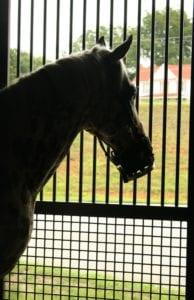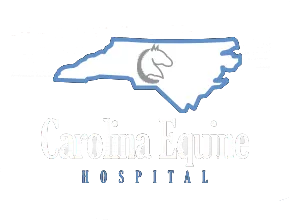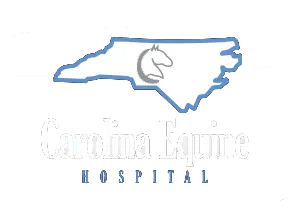Is Your Horse Suffering from Colic? 3 Tips to Keep Them Comfortable While You Wait for the Vet
- posted: Feb. 19, 2021
The moment you notice your horse shying away from his evening meal or trying to distance himself from the herd during meal time when he is usually the first at the gate can make your heart momentarily stop. There is a big reason that colic in the horse community is called “the C word”. It is a very serious and scary situation for both horse and owner, and it can quickly take a turn for the worse. Luckily, there are several steps you can take to make the situation more comfortable for your horse while waiting for the vet.
Keep On Walking
If your horse is down, try to get him up and walk him until the veterinarian arrives. Walking will promote gastrointestinal motility more than standing in a stall (he also won’t be able to roll as easily if you keep him moving). Milder forms of colic that respond well to walking also might benefit from a bumpy ride in the trailer if you are hauling him into the veterinary hospital. A case of gas colic may also respond well to this type of light physical activity.
If you are unable to keep your horse standing and haven’t had any veterinary instructions for sedating him, remember that your own safety should be your first priority. With a horse that is uncomfortable enough that he may lash out with his legs or roll around often due to pain, it may be safer to keep the horse confined to a stall under supervision until the vet arrives.
Hold The Pain Meds Please

Most horse owners have equine pain medication in their equine first aid kit like Banamine and Bute. While having these medications is a good way to be prepared for the worst, they shouldn’t be administered unless the veterinarian has given you or your barn manager the okay.
You can ask your veterinarian if they suggest giving a dose of pain medication while you are on the phone with them prior to them coming out, while also updating them on your horse's current condition and whereabouts.
Take The Food Away
When you are suspecting or dealing with colic, you will want to withhold food from your horse until he has been evaluated by your veterinarian, and you’re given the okay for him to begin eating again (also keep him away from shavings, if possible, as he may try to eat them out of hunger- this may call for the use of a grazing muzzle). Different kinds of colic require different kinds of action to be taken so waiting for feeding instructions from your veterinarian can give your horse a better chance at keeping his tummy trouble at bay! Ask your vet about slowly reintroducing feed back into your horses routine after dealing with any form of colic.
Carolina Equine Hospital
Dealing with any kind of equine emergency can be very stressful, and we understand that. Give us a call as soon as you notice your horse acting unlike himself or refusing to eat so we can get an emergency vet out to take a look at him. Our facility offers farm call visits as well as haul in services for patients that need to be monitored overnight.
Location
Find us on the map
Browns Summit Location
5373 NC Hwy 150
Browns Summit, NC 27214, United States

